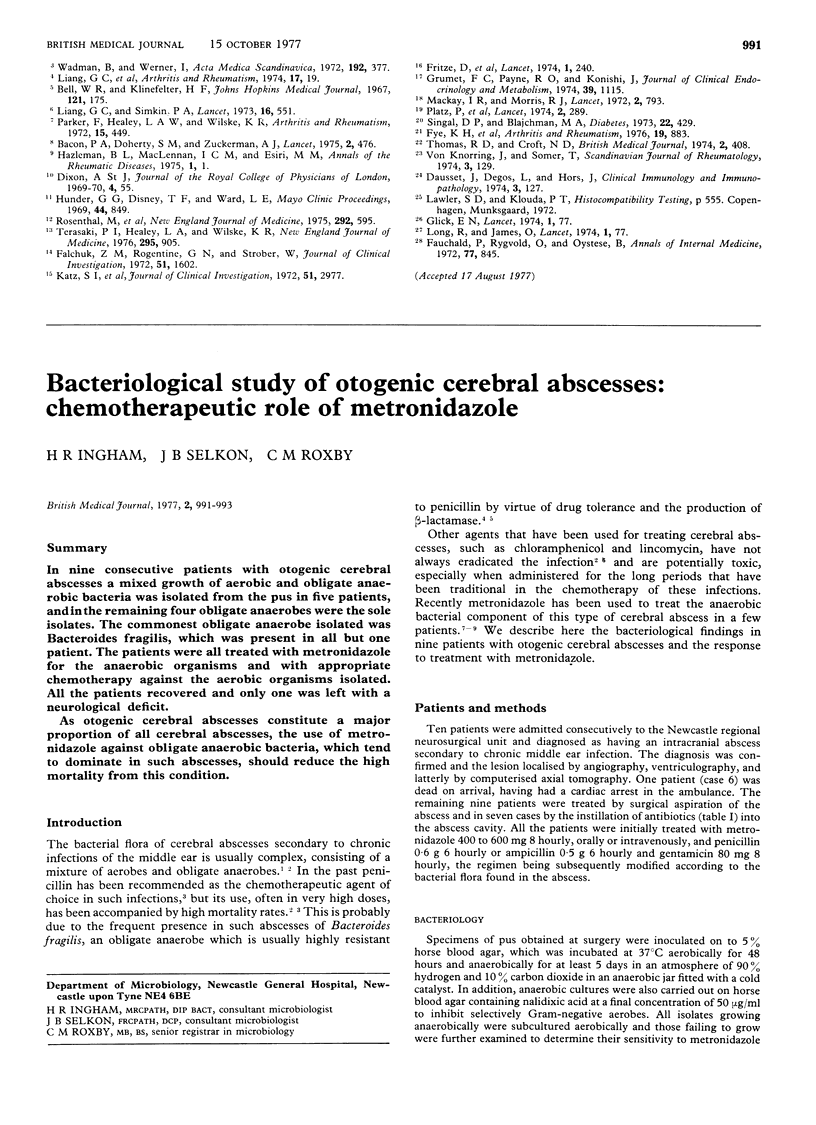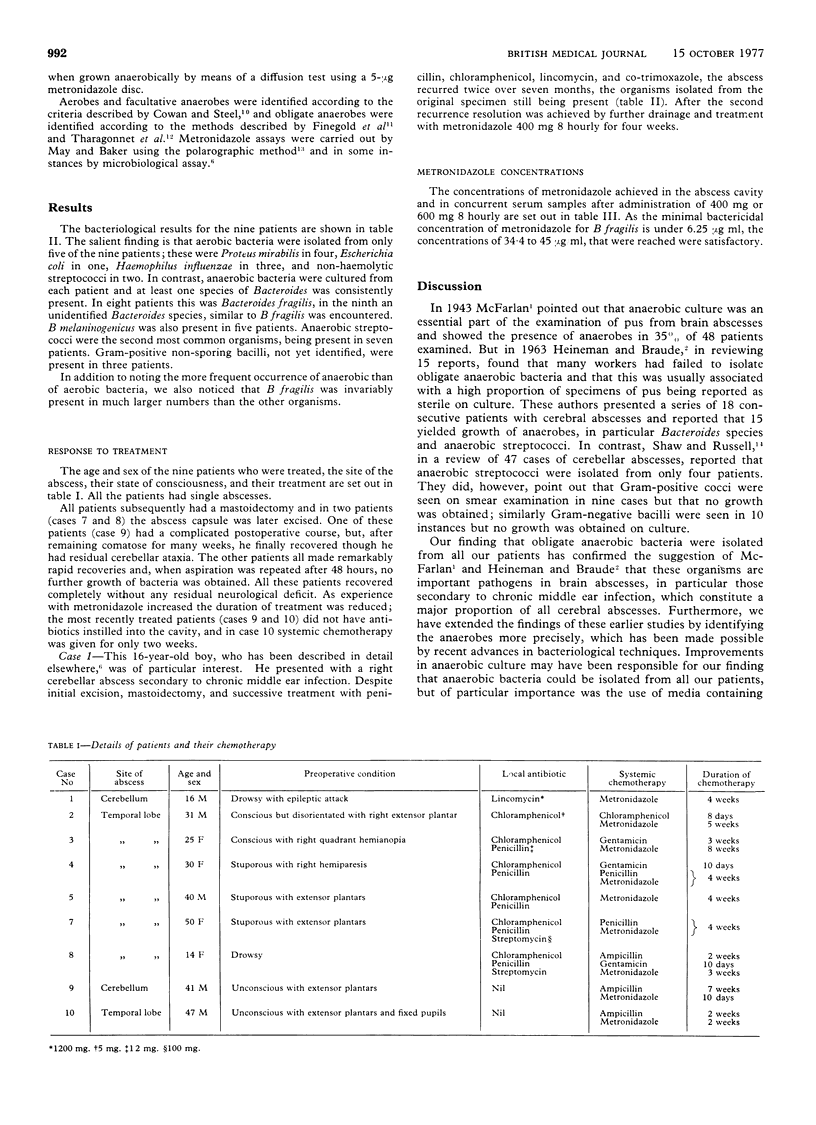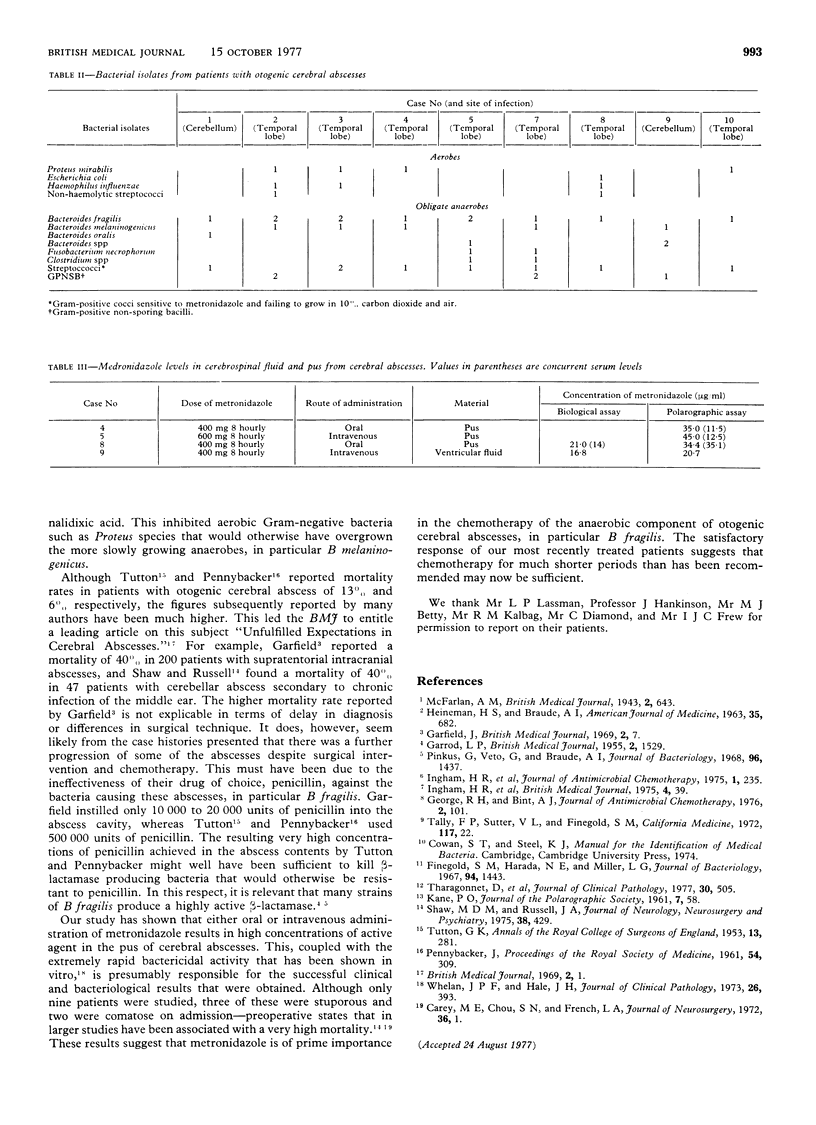Abstract
In nine consecutive patients with otogenic cerebral abscesses a mixed growth of aerobic and obligate anaerobic bacteria was isolated from the pus in five patients, and in the remaining four obligate anaerobes were the sole isolates. The commonest obligate anaerobe isolated was Bacteroides fragilis, which was present in all but one patient. The patients were all treated with metronidazole for the anaerobic organisms and with appropriate chemotherapy against the aerobic organisms isolated. All the patients recovered and only one was left with a neurological deficit. As otogenic cerebral abscesses constitute a major proportion of all cerebral abscesses, the use of metronidazole against obligate anaerobic bacteria, which tend to dominate in such abscesses, should reduce the high mortality from this condition.
Full text
PDF


Selected References
These references are in PubMed. This may not be the complete list of references from this article.
- Finegold S. M., Harada N. E., Miller L. G. Antibiotic susceptibility patterns as aids in classification and characterization of gram-negative anaerobic bacilli. J Bacteriol. 1967 Nov;94(5):1443–1450. doi: 10.1128/jb.94.5.1443-1450.1967. [DOI] [PMC free article] [PubMed] [Google Scholar]
- GARROD L. P. Sensitivity of four species of bacteroides to antibiotics. Br Med J. 1955 Dec 24;2(4955):1529–1531. doi: 10.1136/bmj.2.4955.1529. [DOI] [PMC free article] [PubMed] [Google Scholar]
- Garfield J. Management of supratentorial intracranial abscess: a review of 200 cases. Br Med J. 1969 Apr 5;2(5648):7–11. doi: 10.1136/bmj.2.5648.7. [DOI] [PMC free article] [PubMed] [Google Scholar]
- George R. H., Bint A. J. Letter: Treatment of a brain abscess due to Bacteroides fragilis with metronidazole. J Antimicrob Chemother. 1976 Mar;2(1):101–102. doi: 10.1093/jac/2.1.101-a. [DOI] [PubMed] [Google Scholar]
- HEINEMAN H. S., BRAUDE A. I. ANAEROBIC INFECTION OF THE BRAIN. OBSERVATIONS ON EIGHTEEN CONSECUTIVE CASES OF BRAIN ABSCESS. Am J Med. 1963 Nov;35:682–697. doi: 10.1016/0002-9343(63)90139-6. [DOI] [PubMed] [Google Scholar]
- PENNYBACKER J., DIXON J. W., FULTON CHRISTIE J., DAWES J. D. Discussion on intracranial complications of otogenic origin. Proc R Soc Med. 1961 Apr;54:309–320. [PMC free article] [PubMed] [Google Scholar]
- Pinkus G., Veo G., Braude A. I. Bacteroides penicillinase. J Bacteriol. 1968 Oct;96(4):1437–1438. doi: 10.1128/jb.96.4.1437-1438.1968. [DOI] [PMC free article] [PubMed] [Google Scholar]
- Shaw M. D., Russell J. A. Cerebellar abscess. A review of 47 cases. J Neurol Neurosurg Psychiatry. 1975 May;38(5):429–435. doi: 10.1136/jnnp.38.5.429. [DOI] [PMC free article] [PubMed] [Google Scholar]
- TUTTON G. K. Cerebral abscess--the present position. Ann R Coll Surg Engl. 1953 Nov;13(5):281–311. [PMC free article] [PubMed] [Google Scholar]
- Tally F. P., Sutter V. L., Finegold S. M. Metronidazole versus anaerobes. In vitro data and initial clinical observations. Calif Med. 1972 Dec;117(6):22–26. [PMC free article] [PubMed] [Google Scholar]
- Tharagonnet D., Sisson P. R., Roxby C. M., Ingham H. R., Selkon J. B. The API ZYM system in the identification of Gram-negative anaerobes. J Clin Pathol. 1977 Jun;30(6):505–509. doi: 10.1136/jcp.30.6.505. [DOI] [PMC free article] [PubMed] [Google Scholar]
- Whelan J. P., Hale J. H. Bactericidal activity of metronidazole against Bacteroides fragilis. J Clin Pathol. 1973 Jun;26(6):393–395. doi: 10.1136/jcp.26.6.393. [DOI] [PMC free article] [PubMed] [Google Scholar]


